Unusual Findings review
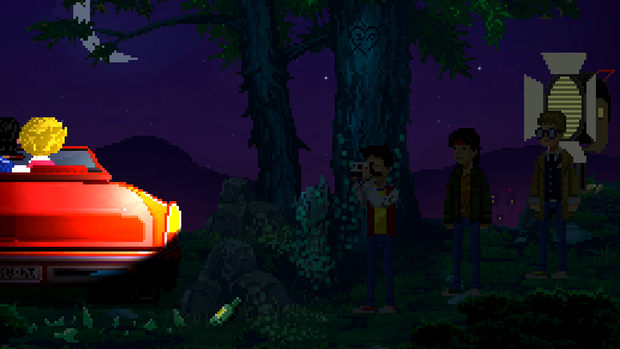
- 1 Comment
Lots of 80s influence unearthed in nostalgia-fueled sci-fi mystery
If you haven’t noticed, 1980s nostalgia is really having a moment in pop culture these days—and for those of a certain age like this writer, it’s for good reason. The 80s represent an era before Gen Z cynicism took over as the prevalent cultural attitude, before being disaffected was mainstream cool. We’ve almost certainly modified our memories of silly multi-camera prime-time sitcoms into a very false belief that real life was as blissful and carefree as movies like Big, The Goonies, Short Circuit, and plenty of others while conveniently forgetting the decade’s very real unpleasantries, but nostalgia of all types generally gives us the warm security blanket of a simpler time in our younger years.
One undeniable achievement of the 1980s was the birth of point-and-click adventures. If you’re anything like me, it’s easy to remember the joy it brought the first time you played through your early Golden Age favorites, while wearing rose-colored glasses in hindsight to overlook their inexcusable flaws. Pure point-and-click adventures, the ones with simple icon interactions, lots of inventory, and lengthy dialogue trees, aren’t exactly permeating pop culture the way the rest of 80s culture is, although retro pixel art is so popular once again it’s like it never went away. Argentina developer Epic Llama has blended these two sources of nostalgia into a game that should be the most obvious drug of choice for me and my contemporaries with Unusual Findings, a solid but flawed old-school adventure that finds itself fixated on the past in many different ways.
The story of Unusual Findings is that of Vincent Falco and his friends Nick and Tony, three very average teenage boys doing the things that teens do in the 80s: playing video games, hiding things in their treehouse hangouts, arguing with siblings, getting in trouble with parents and thus having to sneak out to engage in hijinks—and witnessing what appears to be extraterrestrial activity in the skies over their small town of Northforest while attempting to steal adult movies on scrambled cable television. This all takes place in the very early minutes of the game, which then divides neatly into three acts. The first is a journey through the residential part of town, investigating the immediate aftermath of the alien encounter. That excursion leads to our trio of heroes breaking into a very mysterious and heavily guarded science facility quite curiously situated on the outskirts of this small nondescript town, solving puzzles and avoiding soldiers while trying to find a way back to Northforest. Eventually the third act finds them attempting to save their small town from all manner of science-y evil.
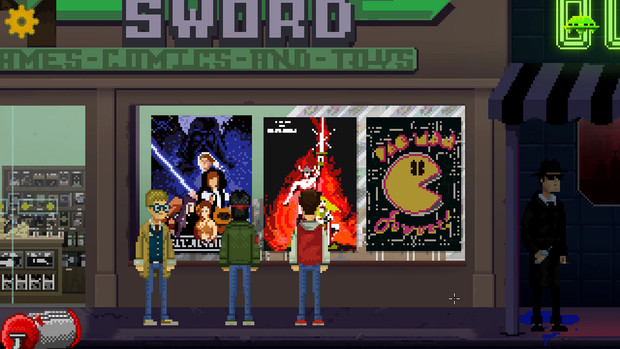
Now, with the game’s title a blatantly obvious twist on one of the most popular American television shows of the last five years (which I refuse to name) in mind, let’s quickly re-recap the premise: a group of teen boys ride their bikes around a town dotted with all kinds of “look, it’s the 80s!” details after noticing some strang—sorry, I mean some mysterious happenings and end up deeply impacted by the giant lab whose location no one can pinpoint the location of. Although there is no pre-teen with supernatural powers here, every other element makes it seem like something more than a tribute—it is almost uncomfortable at times in its desire to emulate a familiar source of current nostalgia rather than doing its own thing. Instead of writing an original adventure with elements of 1980s culture blended in, this feels more like trying to become the actual adventure game adaptation of said show but without the name brand.
This all plays out in a very retro point-and-click fashion, moving your crosshair across the screen and clicking to walk. (You control only Vincent; the other two boys simply follow you around and don’t provide much meaningful support.) Or, when the crosshair passes over a hotspot identified by a text label, you’ll click to bring up an icon allowing you to look at, interact with, or talk to the person or object in question. You’ll accumulate all kinds of inventory and combine it together, sometimes even three or four items, to create new things to use in new puzzles. It’s never too difficult but it certainly requires some thought, and in some cases requires a bit of knowledge that isn’t necessarily doled out within the game.
As the story progresses, it seems to struggle occasionally finding its tone, seemingly unable to decide how silly and almost childish it wants to be vs the adult-oriented dirty comedy and bloody action drama it seems unwilling to fully commit to. The parodies of 80s pop culture elements are goofy and sometimes quite obvious in a way that seems intended to appeal to a very PG-rated demographic (Superman becomes Supersam, Rambo becomes Rocko, etc.) but a reference to the “Booze & Boobs Club” is a surprisingly suggestive bit of content in the midst of so many kid-friendly elements, and there’s quite a body count that forms, including some impressively explosive bad guy deaths.
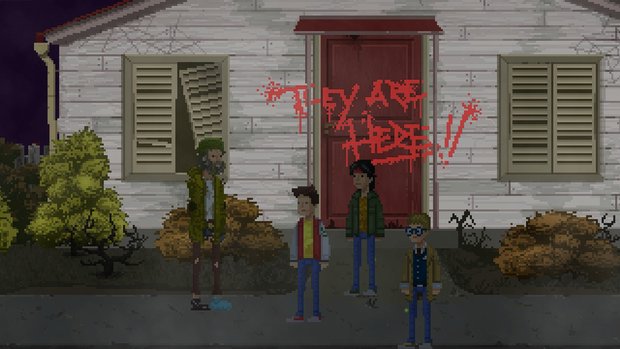
It's difficult to talk critically about the graphics of a game this determined to look like the past, but Unusual Findings is at least a very nice-looking version of the past. The pixel art is colorful and features lots of good character and background detail given the limitations of its 320x200 resolution. The town locations like the arcade and video store are suitably vivid and lively (even at night, when the entire game takes place) but the most impressive visuals are in the spookier moments, like the fog-drenched forest or deep underground, where effective use of shadows and lighting creates a mood far beyond what was possible in the age of the game’s obvious adventure genre influences.
It’s even more of a struggle for me to evaluate the music objectively, as simply listening to the soundtrack makes me giddily (good with this? Goofily too close to goofy, used two paragraphs back) smile and rhythmically nod my head. The background is a delightful, mostly original score of synthwave in the vein of great current artists like The Midnight or Timecop1983, heavy on the synths and midrange basslines and heavier on the catchiness, along with the addition of a handful of well-used licensed tracks (notably Dead or Alive’s “You Spin Me Round”). The game features 16 tracks of original music and a variety of different emotional tones that transition well from the light-hearted enjoyment of biking on your friend’s street, to the much more terrifying darkness of trying to avoid death at the hands of some really stra—I mean, really weird antagonists. I rarely give a second thought to listening to an OST outside the context of playing a game, but this is one I would happily put on at any time, and it’s a shame it’s not available to stream.
It's also too bad that the quality of the voice acting does not match the high standard of the music, which seems to have more to do with oversight than casting. For the most part, though the voices of our three protagonists are a little too similar, they capture the role of awkward mid-puberty teenagers pretty well (though I’m still not entirely sure how old they are supposed to be). The issue is the direction, or lack thereof, of the actors performing them. There are multiple times when they clearly didn’t understand the context of the line they were recording or what they were responding to, and ended up emphasizing the wrong words and changing the meaning of a sentence entirely. There are also frequent typos and ugly grammatical errors in the subtitles, some of which are read too faithfully by the helpless voice actors. And most unforgivably, major touchstones of pop culture are brazenly mispronounced—come on, who doesn’t know how to say Wile E. Coyote’s name?
There are a couple things this very deliberate throwback adventure implements that are firmly rooted in modern sensibility, and one of them is quite an awkward fit: choices. With the explosion of branching storytelling, many games appear afraid to be stuck in the linearity of the past—apparently even adventures that are literally trying to stay stuck in the past in every other meaningful way. So what we get here is a consistent series of two-choice dialogue options, about one every half hour until they actually slow down quite a bit toward the end. Each decision provides a Steam achievement to underscore its significance, but the problem is that in the moment the choices have no obvious consequence at all; they are just two different responses that both appear entirely plausible, maybe with a slight shift in tone by the protagonist (such as either calling your friend a chicken, or reassuring him you’ll be fine in a bit gentler fashion).
Surprisingly, while these aren’t plot-defining choices as we’ve come to understand them, they’re responsible for the game actually altering the way certain puzzles and situations are presented in totally needless ways, such that you may not be able to rely on a walkthrough because of a specific and completely disconnected decision you made. Why would a much earlier unrelated choice affect whether or not the main character wants to lift up a dangerous-looking flask? Replayability is well and good, but this makes very little sense.
Another area where Unusual Findings does not attempt to recapture the past, to its detriment, is its save mechanics. This would have been an ideal game to have a true save system where you can stack up the save files and return to take a look at an earlier area, but no, it is an autosave-only checkpoint system. Perhaps this was an effort to ensure you commit your entire playthrough to the choices you made, but the decisions seem so pointless that I really question the logic of refusing the player access to earlier parts of the game. It also does not provide for cloud saves, which sure would have made life more convenient when I moved from my desktop to laptop without having to start the game over. I understand that there are three possible endings, but it’s still not clear how the branching choices lead to those outcomes, and since the game is a fairly sturdy 7-8 hours and must be restarted fully to experience differently, I didn’t find myself particularly eager to do so.
Final Verdict
Though streamlined in several modern ways—and perhaps modernized in some ways that should have been left alone—Unusual Findings is an adventure game designed to appeal to the cross-section of fans of both early Golden Age point-and-click adventures and 1980s pop culture. If you have no affection for either of those, you can safely move on. For those of us in the target demographic, this is a reasonably good game that looks colorful, feels creative, and has a fantastic soundtrack. The primary issue with Unusual Findings is that, with regard to both the 1980s as a whole and the early point-and-click adventures they spawned, it stretches the rubber band of the “loving homage” description about as far as it can go, to the point of frequently being a fairly uninspired copy of cultural touchpoints. At its best moments, though, it is an exciting and welcoming bit of culture and gaming nostalgia, and that makes it much easier to forgive a number of significant flaws and just enjoy the experience.
Hot take
If you have a healthy tolerance for 1980s fawning and the occasional frustrations of early point-and-click adventures, Unusual Findings is a reasonably fun experience with great graphics and music—as long as you don’t find the more obvious aspects of its referential nature to be too excessive.
Pros
- Colorfully appealing and very era-appropriate graphical style
- Delightful synthwave soundtrack
- Some truly exciting moments in the later part of the game
- Succeeds at appealing to its target audience of nostalgia consumers
Cons
- Poorly directed voice acting
- Frequent inconsistencies in tone
- Implementation of choice mechanics leaves a lot to be desired, especially with a poor save system
- Borrows a little too heavily from current media
Evan played Unusual Findings on PC with a review code provided by the game's publisher.

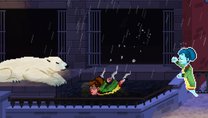

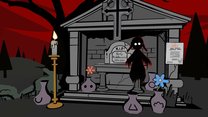
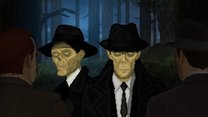
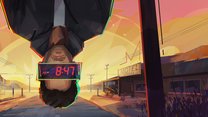
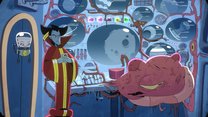

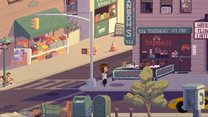
1 Comment
Want to join the discussion? Leave a comment as guest, sign in or register in our forums.
I just tried the demo of this... and a major turn off for me was that they mispronounced Wile E. Coyote. I'm so glad that I found a review that mentions this. Just how?!
Reply
Leave a comment